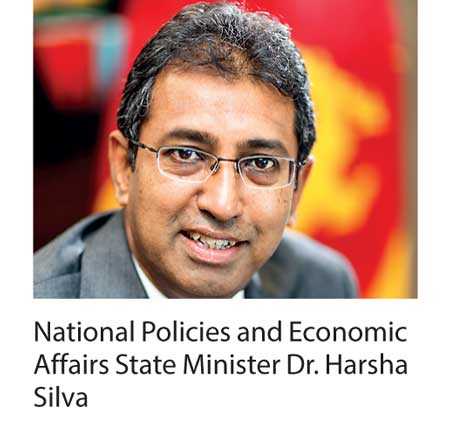Sunday Feb 22, 2026
Sunday Feb 22, 2026
Friday, 21 September 2018 00:00 - - {{hitsCtrl.values.hits}}
 By Chathuri Dissanayake
By Chathuri Dissanayake
As the rupee depreciates daily to new lows, National Policies and Economic Affairs State Minister Dr. Harsha Silva yesterday defended the Government’s stance to refrain from artificially managing the value of the currency, warning of the negative impact an interference may bring.
“As a responsible government we have to come to an agreement and face reality, to ensure the continuity of a stable economic environment we can’t intervene to stabilise the rupee,” he said, speaking at a special press briefing held in Parliament.
The rupee has depreciated by 7.4 % against the US dollar he said, highlighting that the rate was lower than most other currencies in the region including the Indian rupee.
The State Minister of National Policies and Economic Affairs stressed that even if the Government decided to release foreign reserves currently held by the Central Bank, it would not deliver the desired results due to a lack of confidence in Sri Lanka.
“If we release the $9 billion held as reserves the market will not believe that we can do it. The reason is that there is a huge loan burden as never seen before in in Sri Lanka’s history, payable in the future. We have to pay the $4billion taken as international sovereign bonds. This loan is not like earlier debt with long payment periods and low interest rates; these have bullet payments, we have to pay large sums of money and high interest rates,” he claimed.
As a responsible government we cannot release the dollars as we have to repay over $15 billion in the coming years.
The net absorption in the country has improved during the last two years, he claimed. According to him, under the new Central Bank, along with IMF reforms, Sri Lanka has retained reserves from the market as never before, recording a positive net absorption rate of $1,664 million in 2017 from the previous year’s negative $768 million and in 2016, Silva said while quoting figures.
In 2010 the absorption rate was at a negative $ 67 million, in 2011 the absorption rate was a negative $2,840 million while in 2012 the figure remained a negative $1,166 million, which caused the IMF to raise concerns, the Deputy Minister said. In 2013 the figure turned a positive $ 436 million and continued to maintain a positive figure of $ 545million. However, the absorption rate turned a negative $3,250 million in 2015 and continued to be a negative $ 768 million in 2016, he said.
Staunchly defending the Government’s decision not to manage the currency value through the release of foreign reserves, he accepted that there would be challenges in the cost of living and salaries which the country’s economy would have to face.
However, the State Minister explained that the worst was yet to come with upcoming elections in the United States and the trade wars US president Trump had started with economic giants such as China and Europe, but said the crisis may settle with the November elections.
The State Minister also warned that if the country did not take long-term corrective actionsto increase exports, which are currently at 12% of GDP compared to 35% of GDP in 2000, the repercussions would be far worse.
“This is the fundamental issue. We can manage in the short term but if we don’t increase exports then we are not going to make a sustainable recovery,” he said, adding that engaging in cheap politics would not help in the long term.